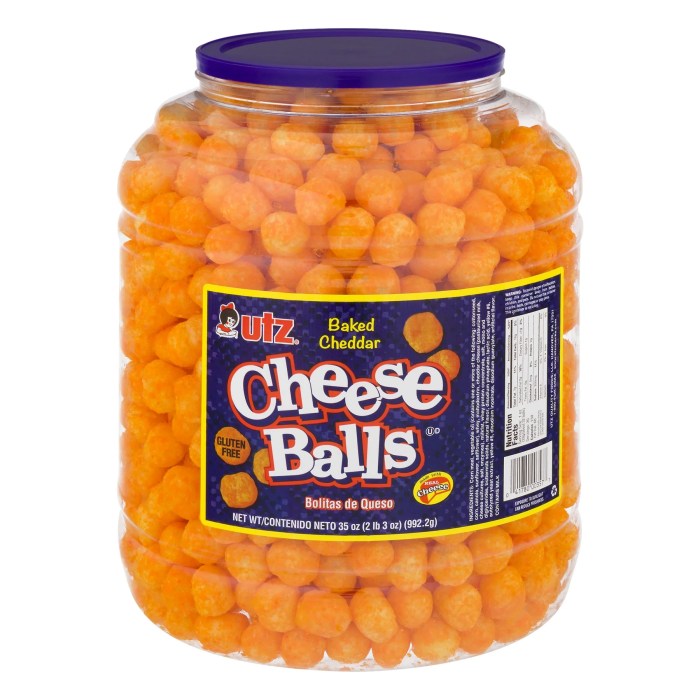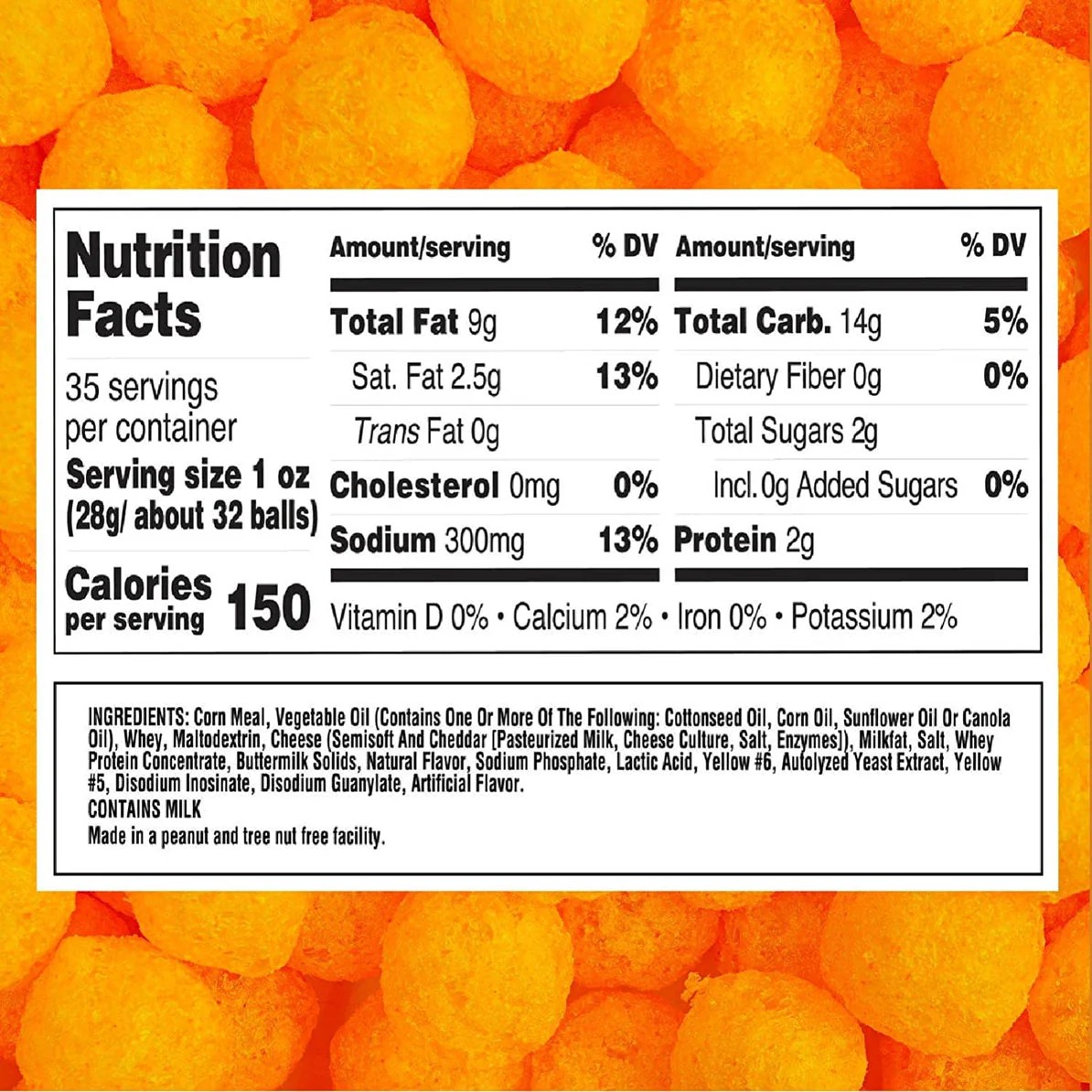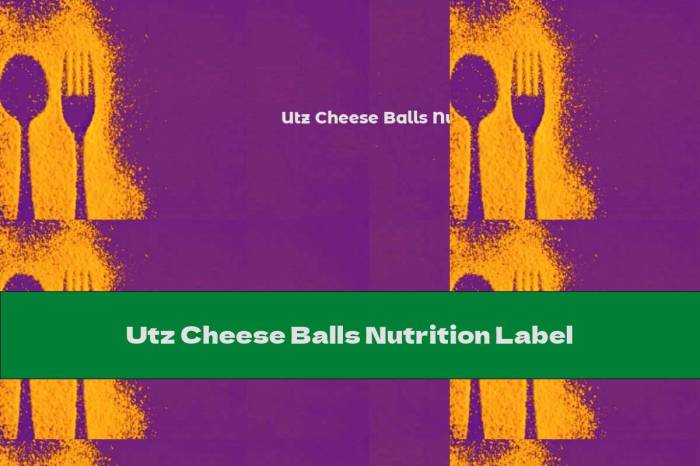Micronutrient Content & Vitamin Analysis: Utz Cheese Balls Nutrition Facts

Utz cheese balls nutrition facts – Yo, peeps! Let’s get real about the nutritional breakdown of those Utz Cheese Balls. We’re not talking about just calories here; we’re diving deep into the vitamins and minerals – the good stuff (or maybe not so good, depending on how you look at it). Think of this as your cheat sheet for understanding what’s actually in those cheesy, crunchy snacks.Utz Cheese Balls, like many processed snacks, aren’t exactly packed with a rainbow of vitamins and minerals.
They primarily offer a decent source of fat and sodium, which we’ve already discussed. However, a closer look reveals small amounts of certain micronutrients. While they shouldn’t be your primary source of daily vitamins, it’s good to know what’s present. Think of it like this: it’s a bonus, not the main course.
Vitamin and Mineral Content per Serving
A typical serving of Utz Cheese Balls (let’s say about 1 ounce, or around 28 grams) will contain trace amounts of several vitamins and minerals. The exact amounts can vary slightly depending on the specific flavor and batch. However, we can expect to find small quantities of things like Vitamin A, some B vitamins (like B12), calcium, and iron.
These amounts are generally quite low compared to the recommended daily intake. For precise figures, you’d need to check the nutrition label on the specific package you’re consuming – remember, those labels are your best friend!
Comparison to Recommended Daily Allowances (RDAs)
Let’s be honest: you won’t be meeting your daily vitamin and mineral needs by munching on Utz Cheese Balls alone. The quantities present are just a tiny fraction of the RDAs. For instance, the amount of Vitamin C might be negligible, while the calcium content is a drop in the ocean compared to what you need for strong bones.
The key takeaway here is that while some vitamins and mineralsare* present, relying on Utz Cheese Balls for your nutritional needs is a big no-no. It’s like trying to fill a swimming pool with a teaspoon – it’s just not gonna happen.
Significant Vitamins and Minerals
While no single vitamin or mineral stands out as being exceptionally high, the presence of a small amount of Vitamin B12 is worth mentioning. Vitamin B12 is crucial for nerve function and red blood cell formation. However, the amount in Utz Cheese Balls is insignificant compared to the amounts found in foods like meat, poultry, and dairy. Similarly, the trace amounts of calcium contribute minimally to your daily calcium intake.
Understanding Utz cheese balls nutrition facts requires careful consideration of their ingredients. A similar examination of processed cheese products is needed, for instance, by checking a cheese pizza nutrition label to compare fat and sodium content. This comparative approach helps contextualize the nutritional profile of Utz cheese balls, highlighting potential differences in caloric density and overall nutritional value.
Remember, it’s all about balance – and Utz Cheese Balls definitely shouldn’t be the cornerstone of a balanced diet.
Key Micronutrients and Potential Health Implications
- Sodium: High sodium intake is linked to high blood pressure and other health issues. Utz Cheese Balls are definitely high in sodium, so moderation is key. Think about it – a few cheese balls are fine, but a whole bag? Not so much.
- Fat: These are primarily fats from cheese and oils used in processing. While some fats are essential, excessive fat intake can contribute to weight gain and other health problems. Again, moderation is your friend.
- Vitamin B12 (trace amounts): Contributes minimally to your daily B12 needs. Don’t rely on cheese balls for this essential vitamin.
- Calcium (trace amounts): Provides a negligible amount towards your daily calcium requirements. Focus on dairy, leafy greens, and other calcium-rich foods.
Sodium and Cholesterol Content

Yo, Surabaya peeps! Let’s get real about those Utz Cheese Balls. We know they’re bomb, but we also gotta be mindful of what we’re putting in our bodies, right? This section breaks down the sodium and cholesterol levels – crucial info for maintaining that healthy lifestyle.
Knowing the sodium and cholesterol content in Utz Cheese Balls is key, especially if you’re watching your salt intake or have high cholesterol. Overdoing it on either can seriously impact your health.
Sodium Content per Serving
A typical serving of Utz Cheese Balls contains a significant amount of sodium. The exact amount varies slightly depending on the package size and specific flavor, but it’s generally in the range of 150-200 milligrams per serving. That’s a pretty hefty chunk of your daily recommended sodium intake, which is generally around 2,300 milligrams for most adults. Eating too much sodium can lead to water retention, bloating, and increased blood pressure.
For those already dealing with hypertension (high blood pressure), consistently consuming high-sodium snacks like Utz Cheese Balls can worsen their condition and increase the risk of heart disease and stroke.
Health Implications of High Sodium Intake
Excessive sodium intake is a major concern for many, especially those with pre-existing conditions. High blood pressure, often linked to high sodium consumption, is a silent killer. It damages blood vessels, increases the risk of heart attacks and strokes, and can lead to kidney problems. Even if you don’t have high blood pressure, consistently consuming high amounts of sodium can increase your risk of developing it later in life.
It’s all about balance, cuy! Moderation is key. Think about swapping those cheese balls for healthier snacks sometimes.
Cholesterol Content per Serving
Utz Cheese Balls contain cholesterol, mostly due to the cheese content. The exact amount per serving again varies slightly depending on the specific flavor and package size, but it’s usually around 10-15 milligrams per serving. While this amount might not seem alarming on its own, it adds up, especially when combined with other cholesterol-rich foods throughout the day.
Health Effects of Cholesterol Intake
Cholesterol is a fatty substance that’s essential for some bodily functions, but too much can lead to problems. High levels of LDL (“bad”) cholesterol contribute to the buildup of plaque in your arteries, leading to atherosclerosis (hardening of the arteries). This increases your risk of heart disease, stroke, and other cardiovascular problems. While the cholesterol in a single serving of Utz Cheese Balls might not be a huge deal, regular consumption of high-cholesterol foods, coupled with other unhealthy lifestyle choices, can significantly increase your risk.
Think of it like this: one cheese ball isn’t a problem, but a whole bag every day? That’s a different story.
Allergens and Potential Dietary Restrictions

Yo, Surabaya peeps! Let’s get real about those Utz Cheese Balls – they’re bomb, but we gotta be mindful of what’s inside, especially if you’ve got some dietary restrictions or allergies. Knowing what’s in your snack is key, especially if you’re sensitive to certain ingredients.Utz Cheese Balls contain several common allergens, so it’s crucial to check the label carefully before you munch.
Ignoring this can lead to some serious issues, so pay attention!
Milk Allergens
Milk is a major component of Utz Cheese Balls, being the primary ingredient in the cheese itself. This means anyone with a milk allergy or lactose intolerance needs to steer clear. A milk allergy can cause anything from mild discomfort to a full-blown anaphylactic reaction, which is a serious medical emergency. Even a tiny amount can trigger a reaction in some individuals, so it’s not something to take lightly.
Always check the ingredient list and consider the potential severity of your reaction before consuming.
Soy Allergens, Utz cheese balls nutrition facts
While not always present, some Utz Cheese Ball varieties might contain soy ingredients, like soy lecithin, which is often used as an emulsifier. Soy is another common allergen, and reactions can range from mild skin rashes to severe respiratory problems. Again, carefully examining the ingredient list is vital for those with soy allergies.
Potential for Other Allergens
Besides milk and potentially soy, other allergens could be present depending on the specific Utz Cheese Ball flavor or manufacturing processes. These could include traces of nuts, wheat, or other common allergens. Cross-contamination during manufacturing is a possibility, so always refer to the product label for the most up-to-date and accurate allergen information. Manufacturers are legally obligated to list all major allergens, but it’s still your responsibility to check.
Dietary Restrictions Summary
In short, Utz Cheese Balls pose potential risks for individuals with milk allergies and those sensitive to soy. The possibility of cross-contamination with other allergens also exists, highlighting the importance of always checking the product label before consumption. If you have any food allergies or sensitivities, it’s crucial to prioritize your safety and read the label meticulously before enjoying these cheesy snacks.
Don’t risk it – your health is way more important than a snack!
Query Resolution
Are Utz Cheese Balls gluten-free?
No, Utz Cheese Balls contain wheat flour, making them not suitable for those with gluten intolerance or celiac disease.
How many servings are in a bag of Utz Cheese Balls?
The serving size and number of servings per bag varies depending on the package size. Check the nutrition label on your specific bag for accurate information.
Can I eat Utz Cheese Balls if I’m on a low-fat diet?
Utz Cheese Balls are relatively high in fat. If you’re on a low-fat diet, they should be consumed sparingly, if at all. Consider healthier alternatives.
Are Utz Cheese Balls a good source of protein?
While they do contain some protein, they are not a significant source compared to other protein-rich foods. They are primarily a source of carbohydrates and fat.


